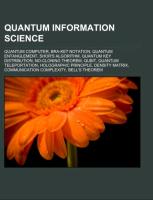- Start
- Quantum information science
Quantum information science
Angebote / Angebote:
Source: Wikipedia. Pages: 126. Chapters: Quantum computer, Bra-ket notation, Quantum entanglement, Shor's algorithm, Quantum key distribution, No-cloning theorem, Qubit, Quantum teleportation, Holographic principle, Density matrix, Communication complexity, Bell's theorem, Timeline of quantum computing, Quantum LC circuit, Decoherence-free subspaces, Nitrogen-vacancy center, Quantum algorithm, Walter De Brouwer, Quantum cryptography, Bekenstein bound, Multipartite entanglement, Quantum error correction, Trapped ion quantum computer, Waterloo Institute for Nanotechnology, Quantum digital signature, Quantum circuit, Toric code, Phase qubit, Squashed entanglement, D-Wave Systems, Quantum gate, Quantum convolutional code, Quantum programming, Institute for Quantum Computing, Fidelity of quantum states, Quantum t-design, Pockels effect, No-communication theorem, Quantum pseudo-telepathy, Quantum cellular automata, Circuit quantum electrodynamics, Leggett-Garg inequality, Centre for Quantum Technologies, Quantum energy teleportation, Topological quantum computer, Controlled NOT gate, Bures metric, Separable states, Quantum no-deleting theorem, Continuous quantum computation, Flux qubit, Bell state, NOON state, One-way quantum computer, BB84, Dephasing, Quantum game theory, Superdense coding, Kane quantum computer, Weak measurement, LOCC, Systolic freedom, Loss-DiVincenzo quantum computer, Time-bin encoding, Universal quantum simulator, Quantum cloning, Range criterion, Quantum technology, State-merging, Quantum clock, Graph state, Cavity quantum electrodynamics, Quantum lithography, Superconducting quantum computing, Cat state, Purification of quantum state, Qutrit, Reduction criterion, Charge qubit, Quantum bus, Phase factor, Nuclear magnetic resonance quantum computer, Quantum network, Quantum imaging, Leggett inequality, AQUA@home, Gottesman-Knill theorem, No-broadcast theorem, Reduced dynamics, Quantum neural network, Quantum robot, Quantum metrology, Classical information channel, Center for Quantum Information Science & Technology, Cluster state, Margolus-Levitin theorem, Concurrence, Quantum sort, Quantum sensor, Quantum virtual machine, Quantum Markov chain, Steane code, Pauli group, Quantum spin model, Trace distance, Entropy exchange, Quantum fingerprinting, Quantum register, Ancilla, Quantum processing unit, Libquantum. Excerpt: In theoretical physics, Bell's theorem (a.k.a. Bell's inequality) is a no-go theorem, loosely stating that: The theorem has great importance for physics and the philosophy of science, as it implies that quantum physics must necessarily violate either the principle of locality or counterfactual definiteness. It is the most famous legacy of the late physicist John Stewart Bell. Results of tests of Bell's theorem agree with the predictions of quantum mechanical theory, and demonstrate that some quantum effects travel faster than light. Hence the class of tenable 'hidden variable' theories are limited to the non-local variety. However, none of the tests of the theorem performed to date has fulfilled all of the requisite conditions implicit in the theorem. Accordingly, none of the results are totally conclusive. Bell's theorem implies that the concept of local realism, favoured by Einstein, yields predictions that disagree with those of quantum mechanical theory. Because numerous experiments agree with the predictions of quantum mechanical theory, and show correlations that are stronger than could be explained b...
Folgt in ca. 5 Arbeitstagen

